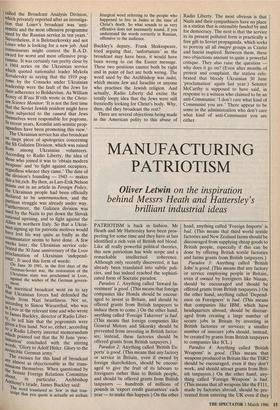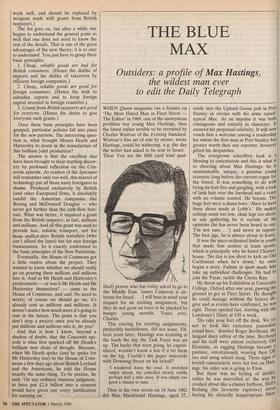MANUFACTURING PATRIOTISM
Oliver Letwin on the inspiration
behind Messrs Heath and Hattersley's brilliant industrial ideas
PATRIOTISM is back in fashion. Mr Heath and Mr Hattersley have been pros- pecting for some time and they have at last identified a rich vein of British red blood. Like all really powerful political theories, this new patriotism has wide scope and a remarkable intellectual coherence. Although only recently discovered, it has already been translated into subtle poli- cies, and has indeed reached the sophisti- cated form of Socratic paradox.
Paradox 1: Anything called 'Inward In- vestment' is good. (This means that foreign companies like Honda should be encour- aged to invest in Britain, and should be offered grants from British taxpayers to induce them to come.) On the other hand, anything called 'Foreign Takeover' is bad. (This means that foreign companies like General Motors and. Sikorsky should be prevented from investing in British factor- ies; instead, these factories should be offered grants from British taxpayers.) Paradox 2: Anything called 'British Ex- ports' is good. (This means that any factory or service in Britain, even if owned by foreign shareholders, should be encour- aged to give the fruit of its labours to foreigners rather than to British people, and should be offered grants from British taxpayers — hundreds of millions of pounds in `export credit guarantees' each year — to make this happen.) On the other hand, anything called 'Foreign Imports' is bad. (This means that third world textile factories and New Zealand farms should be discouraged from supplying cheap goods to British people, especially if this can be done by offering British textile factories and farms grants from British taxpayers.) Paradox 3: Anything called 'British Jobs' is good. (This means that any factory or service employing people in Britain, even if owned by foreigners like Nissan, should be encouraged and should be offered grants from British taxpayers.) On the other hand, anything called `Depend- ence on Foreigners' is bad. (This means that companies like IBM, which have headquarters abroad, should be discour- aged from creating a large number of secure jobs in Britain by investing in British factories or services; a smaller number of insecure jobs should, instead, be created by grants from British taxpayers to companies like ICL.) Paradox 4: Anything called 'British Weapons' is good. (This means that weapons produced in Britain like the TSR2 should be encouraged, even if they don't work, and should attract grants from Brit- ish taxpayers.) On the other hand, any- thing called 'Foreign Weapons' is bad. (This means that all weapons like the F111, made by factories abroad, should be pre- vented from entering the UK even if they work well, and should be replaced by weapons made with grants from British taxpayers.) The list goes on, but after a while one begins to understand the general point so well that one does not need to know the rest of the details. That is one of the great advantages of the new theory: it is so easy to understand. You just have to grasp three basic principles.
1. Cheap, reliable goods are bad for British consumers. (Hence the dislike of imports and the dislike of takeovers by efficient foreign companies.) 2. Cheap, reliable goods are good for foreign consumers. (Hence the wish to subsidise exports and to keep foreign capital invested in foreign countries.) 3. Grants from British taxpayers are good for everyone. (Hence the desire to give everyone such grants.) Once these basic principles have been grasped, particular policies fall into place for the new patriots. The interesting ques- tion is, what brought Messrs Heath and Hattersley to invest in the manufacture of this brilliant joint production?
The answer is that the excellent duo have been brought to their startling discov- ery by profound reflection on the Con- corde episode. As readers of the Spectator will remember only too well, this marvel of technology put all those nasty foreigners to shame. Produced exclusively by British (and other European) firms, it absolutely outdid the American companies like Boeing and McDonnell Douglas — who never got further than the cash-flow fore- cast. What was better, it required a grant from the British taxpayer; in fact, millions and millions. And all this grant was used to provide fast, reliable transport, not for those stuffed-shirt British travellers (who can't afford the fares) but for nice foreign businessmen. So it exactly conformed to the basic principles of the New Patriotism.
Eventually, the House of Commons got a little restive about the project. They wanted to know whether we should really go on pouring these millions and millions into it. And so Mr Heath and Hattersley's predecessors — or was it Mr Heath and Mr Hattersley themselves? — came to the House of Commons, and said: No need to worry; of course we should go on; it's already cost us millions and millions. It doesn't matter how much more it's going to cost in the future. The point is that you don't stop a project once you've already put millions and millions into it, do you?
And that is how I know, beyond a shadow of doubt, that the Concorde epi- sode is what first sparked off Mr Heath's brilliant new chain of thought. Because, when Mr Heath spoke (and he spoke for Mr Hattersley too) to the House of Com- mons a few days ago about British Leyland and the Americans, he told the House exactly the same thing. To be precise, he said: 'On any ordinary business judgment, to have put £2.6 billion into a concern would have given one every justification for carrying on.'















































 Previous page
Previous page